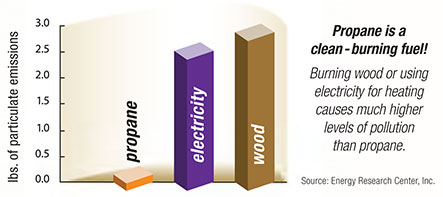Lay Your Worries Aside
We want you to feel good about using propane while knowing that we always have your best interests at heart. With that in mind, here are some tips for staying safe and keeping comfortable. We hope this information gives you more time to relax — and less time worrying.

Shelter from the Storm
With severe storms seemingly becoming the “new normal,” here are some suggestions to help you prepare and stay safe.
- Keep an ample supply of fuel. If you use a backup generator, make sure it has enough fuel. Check the owner’s manual for instructions on calculating how much propane your generator uses. (For generators 9kW or less, it’s approximately 1.5 gallons per hour.) Keep your generator well maintained so it runs properly.
- If your area is prone to flooding, make sure your tank is anchored securely.
- Once the storm passes, check your area for downed power lines, damaged gas lines or damage to your fuel tank. (If it is dark, use flashlights, not candles.)
- Don’t use outdoor appliances indoors and make sure your indoor gas appliances are properly vented.
- Check your appliances for water or other damage. Never turn on a light switch, use a power source or inspect your appliances while you are standing in water. If you think your appliances have been damaged, get them inspected before using them again. Any damaged parts should be replaced right away to ensure continued safe operation.
- If you smell gas, leave your home right away. After only the quickest glance at the on/off knobs on your stove (to see if that’s the source of the problem), open a window or two as you quickly exit the house with your family. Do not smoke or operate lights, appliances, telephones or cell phones. Go to a safe location where you can report the problem to us. You should also call 911 to report the leak.
Where Does Propane Come From
Propane is extracted mainly from natural gas, although it can also be produced from heating up crude oil. Once propane gas is captured, it is slowly cooled until it condenses into a liquid, at which point it is stored under pressure. This is why propane is called liquefied petroleum gas, or LP gas.
Compressed in this way, propane takes up a small amount of space — but delivers a whole lot of energy! When you need propane, it’s released slowly and safely from a valve in your tank and becomes a gas again.
Feel Good about Propane
We’re proud to deliver an environmentally friendly and efficient fuel to your home!
By using propane appliances in your home instead of electric or wood-burning ones, you cut emissions and help preserve the environment. Coal and other fossil fuels need to be burned to create electricity in the first place. And that releases pollutants into the atmosphere. Wood-burning appliances are not nearly as efficient as propane appliances because a lot of the heat generated by the wood gets wasted up the chimney. As a propane consumer, you can feel good about using a fuel that helps to reduce carbon emissions without compromising your comfort.

Do You Have Generator Envy?
All it takes is one power outage and people start getting generator envy — the feeling you get when you see your neighbor’s lights on during a power outage while you’re sitting in the dark. This is making the idea of installing whole-house backup propane generators very popular.
Whole-house propane generators are a better and safer option than noisy, smelly gasoline-powered portable generators. Portable generators provide power for just a few electrical circuits and emit dangerous carbon monoxide fumes. In contrast, quiet whole-house propane generators supply power safely for every circuit in the home, including your heating and cooling systems.
If you already own a generator, follow the tips here to keep your home and family safe.
Safety Tips for Generators
With more and more people relying on both portable and permanent generators than ever before, our team wanted to share the following emergency generator safety tips:
- Installed whole-house generators should have a transfer switch to ensure a smooth transition when the lights go out. A transfer switch cuts electricity flow to the grid while the generator is on. This prevents the power in the generator from “back-feeding” into outside power lines and potentially injuring utility crews.
- Never operate a portable generator in an enclosed or partially enclosed space; keep it outside at least 10 feet from your home and away from windows and doors.
- If your generator is not connected to a propane tank, be sure to store generator fuel in a properly labeled container.
- Always use a grounded extension cord with the proper power rating.
- Have your generator checked and adjusted annually for safety and efficiency.
